Electric heaters are convenient for heating homes during cold weather. However, they always come with a hefty electricity bill if you let the temperature soar. So, how much electricity does an electric heater use?
An electric heater uses electricity to produce heat. The amount of electricity used depends on the type of heater and the temperature setting.
Although convenient, comparatively to other heat sources, electric heaters are fairly inefficient at converting energy to heat. If you want to save money on your power bill, consider buying the most efficient model you can.
This article tells you all you need to know about electric heaters and answers the question; do electric heaters use a lot of energy?
Electric Heaters
Electric heaters are a quick way to heat spaces and can be budget-friendly to purchase.
You can buy a variety of electric heaters online and in-store, but before you decide on the type, you might be wondering about the differences between them all.
There are two main types of electric heaters:
Wall-mounted heaters are compact and easy to install. Because they don’t take up a lot of floor space, these heaters are perfect for small spaces such as bedrooms, yet are also ideal for much larger spaces such as garages, basements, and sheds.
Portable heaters are small enough to carry from room to room. They are also great for use in unheated areas such as garages and basements.
They are also, however, small enough and designed to fit in a typical room in the house.. These only provide heat for a short amount of time. A portable heater is best suited for smaller rooms where you plan to move it around frequently. It’s easy to carry and set up
Do Electric Heaters Use A Lot of Electricity?

The amount of electricity that an electric heater consumes depends on how hot you set it. For example, if you turn up the thermostat from 15 °C to 21 °C, the heater will consume more electricity.
The amount of electricity needed by an electric heater also varies depending on the size of the room where it’s installed.
To determine how much energy an electric heater uses, multiply its wattage (watts) by the number of hours it runs each day. An example of this is that a 2kW heater can cost around 40p to run at full power which equates to around £11.20 per week if running for an average of four hours a day.
Although you won’t be getting the calculator out every day, noting down these calculations now and then and having a rough idea can help you in the long term.
To find out how much electricity your current electric heater uses, you can also check the label on the back of the unit. It should state the wattage.
How Do I Choose An Electric Heater?
When choosing an electric heater, look for well-reviewed models. This can help you make sure that the heater you select is reliable.
When shopping for an electric heater, keep in mind that generally the higher the wattage, the hotter the temperature. However, the higher the wattage of the heater, the more expensive it is to run.
Consider buying a heater that has a timer, this is because it is expensive to run but also a fire hazard if left unattended. A timer will help even if you don’t remember to switch it off when you leave the room or go to sleep.
This will save money because you won’t be paying for electricity while you aren’t home, and it will reduce the risk of a fire.
You can also buy a heater that automatically turns itself off after a certain period. This feature is especially useful if you use the heater all night long and forget to set the installed timer.
Pros And Cons Of An Electric Heater
Electric heaters are great for providing instant warmth without the mess of burning wood. They’re also convenient because they don’t require any maintenance, and they are very popular, being widely used throughout the world.
However, with today’s energy prices they could be very costly to run for any significant period of time.
There are some downsides to owning an electric heater. The most obvious downside is that they take up space. You’ll need to install them in areas where you plan to spend a lot of time, such as living rooms or bedrooms.
Another drawback is that they tend to produce a lot of noise. Many people complain that electric heaters create too much noise, which can disrupt children sleeping or them hearing the television.
Many people say that they prefer to stay warm with a fireplace instead of an electric heater because of this reason.
Another disadvantage of electric heaters is that they only provide indirect heating. That means that the warmth from the heater doesn’t reach the floor or other surfaces directly.
Instead, it heats the surrounding air. As a result, it takes longer for the air to get hot enough to feel comfortable. Because electric heaters are so easy to install, homeowners often put them in places where they shouldn’t be. Children might accidentally knock over a heater and start a fire if this is the case.
Final Thoughts
We hope after reading this article you understand that while convenient, electric heaters do use a significant amount of energy for the job that they do. Comparatively to other heat sources, even the most efficient electric heater will not be as efficient as something like underfloor heating or even a central heating system.
If you are considering buying an electric heater be sure to buy one that does the job for you as a short term solution while thinking about a better, modern energy efficient option for the long term.